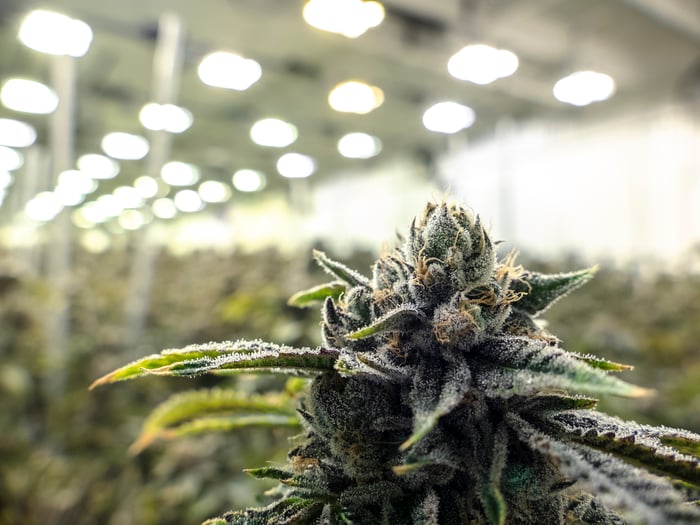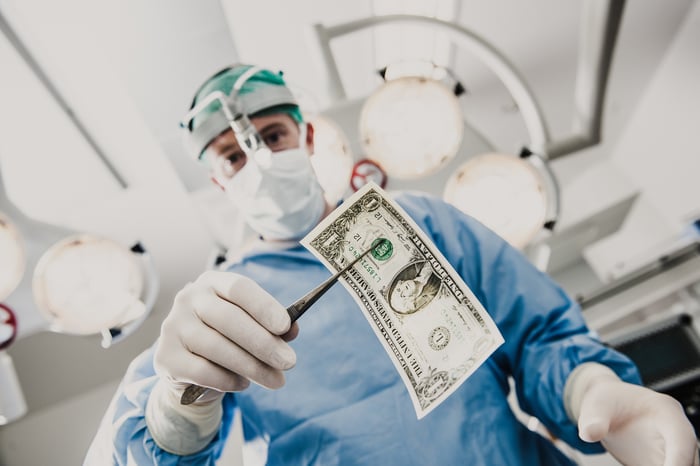3 Healthcare Stocks to Buy and Never Sell
A holding period of forever sounds perfect for these top-tier businesses.
by Sean Williams (TMFUltraLong)At a time when computers and algorithms dominate trading activity, it should come as no surprise that the average holding period for stocks is near an all-time low. According to independent research solutions company Ned Davis Research, the average holding period of stocks has fallen from nearly eight years in the late 1950s to just 8.3 months by the end of 2016. With the barrier to information gone -- i.e., it's just a mouse click away -- and most major brokerages moving to $0 commission trades, the urge to dive in and out of stocks is arguably higher than it's ever been.
But as investors, we also know that timing the market over the long run with success just isn't possible. Investors who take a long-term approach typically see the strongest and most sustainable returns.
With this in mind, if you want to give yourself an opportunity to bask in long-term share price appreciation, or perhaps collect a decent amount of income in the process, without ever having to sell your holdings, consider buying these three healthcare stocks.

Johnson & Johnson
Healthcare conglomerate Johnson & Johnson (NYSE:JNJ) might not be the growth stock it once was, but it's about as steady as they come in the sector. In fact, J&J is one of only two publicly traded companies to boast the AAA credit rating from Standard & Poor's. That means S&P has more faith in Johnson & Johnson's repaying its debts than it does of the U.S. federal government's making good on its own debt obligations -- and that's saying something.
What makes Johnson & Johnson so special is the company's three business segments, each of which accomplishes something that the others don't. First, there's consumer health products, which is the slowest growing but provides some of the strongest pricing power and most predictable cash flow. Next up is medical devices, which has been hit in recent years by commoditization, but should pay off over the long run as an aging population leans more heavily on devices to improve their quality of life. Finally, there's the company's pharmaceuticals segment, which provides the juiciest margins but is constrained by the finite nature of patent exclusivity. Each segment brings an important piece to the table that completes the puzzle.
How good is J&J as a business? In 2018, the company wound up reporting its 35th consecutive year of adjusted operating earnings growth, which comes atop a 57-year streak of having increased its dividend. That places Johnson & Johnson among the most elite of Dividend Aristocrats. Regardless of whether the economy is booming or struggling through its worst recession in 70 years, J&J's adjusted operating earnings and dividend are motoring higher. That's why you'll never need to sell this stock.

Innovative Industrial Properties
If you'd like to add a bit more growth potential to your portfolio without having to significantly up your risk, consider buying cannabis real estate investment trust (REIT) Innovative Industrial Properties (NYSE:IIPR).
The idea behind a cannabis-focused REIT is simple. Innovative Industrial Properties acquires medical marijuana cultivation farms and processing sites in the U.S., and then leases these assets out for an extended period of time, thereby reaping the reward of rental income. IIP, as the company is also known, also passes along an annual 3.25% rental increase, which helps to ensure it stays ahead of the inflationary curve and collects a 1.5% property management fee based on the rental rate. In other words, the company primarily grows its revenue and net operating income through acquisitions, but it also has a modest built-in organic growth element that's often overlooked.
What makes Innovative Industrial Properties so safe is the length of its contracts and the transparency of its deals. Having begun the year with 11 assets owned, IIP now has 42 properties spread across 13 states. The weighted-average remaining lease length is 15.5 years on these assets, with an average return on invested capital of 13.6%. That means it should take just over five years for IIP to completely recoup its $431.2 million in invested capital.
The point is that Innovative Industrial Properties provides certainty in an industry that's exceptionally high growth, is still in the process of maturing, and typically provides zero predictability. And right now, it's not only the lone dividend-paying pot stock, but it's also divvying out a high yield of 4.3%. This is a stock you can hang on to for a very long time without any worries.

Intuitive Surgical
Arguably, I've saved the best for last with robotic-assisted surgical device maker Intuitive Surgical (NASDAQ:ISRG), which I recently referred to as the "closest thing to a surefire investment."
For starters, this is a company that's installed more than 5,400 of its highly advanced da Vinci surgical systems around the world, through September. You could add up all of Intuitive Surgical's competitors, and they wouldn't even come close to the company's installed base. Considering these da Vinci systems are pricey -- $0.5 million to $2.5 million per system -- and that there are a lot of hours that go into training surgeons to use it, there's also very little customer churn. Put another way, once Intuitive Surgical locks in a customer, it tends to keep them in their robotic surgery sphere for a very long time.
What else is impressive is that Intuitive Surgical's operating margins have the potential to get better over time. When the company was a lot younger, it was reliant on generating most of its revenue from the sale of its da Vinci systems. While these are expensive, they're generally a lower-margin item given that they cost a lot to build. The bulk of the margins generated by this company come from providing instruments with each procedure and regular servicing of the systems. In essence, as the number of installed da Vinci systems increases, the percentage of higher margin revenue in relation to total sales will rise as well.
Finally, understand that Intuitive Surgical has only realized a fraction of its surgical potential. Sure, it's the leader in urology and gynecology surgeries, but it's only playing a small role in thoracic, colorectal, and general soft tissue surgeries. Therefore, there's a long runway for the company to gobble up market share. Although investors aren't privy to a dividend from Intuitive Surgical, I believe they'll gladly forgo it in return for the chance at consistent low-double-digit growth.